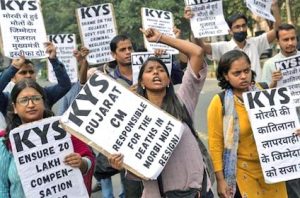
INDIA, November 14— Over 160 people lost their lives in Morbi, Gujarat when a newly renovated suspension bridge collapsed. Scores of others were injured. People immediately suspected corruption was at the root of the problem. “A bridge that is more than 140-years old survived all this time, but just collapsed after being restored. It must be corrupt contractors profiting by cutting costs.”
This tragic story is not only a story of ‘corrupt contractors.’ It is an indictment of the profit system, its greed, its callousness, and its calculated neglect in planning to blame the masses who are the victims. It is a story of fascism that is engulfing the whole world. Our response must be to smash fascism with communist revolution. Communism will create a society built by the masses, not profit.
Doing More to Fight Fascism
Our collective in New Delhi met to discuss how to build communism while facing the rulers’ increasing fascist attacks. We have been active in anti-fascist protests, but (self critically) we recognize that our response to growing fascism is not adequate. We have not fully grasped it as a life and death problem for the working class.
This generated a very lively discussion. A comrade pointed out that in Gujarat, which has become an ‘incubator’ of fascism, attacks on Muslims and Dalits are intensifying every day. The fascist BJP and its contractors use a bulldozer factory in the city of Gujarat to demolish Muslims’ homes. While the BJP supporters demolish the homes of Muslims, it becomes easy for them to completely decimate public health.
Garment Comrades Meet with Public Health Workers
Party garment workers in Bengaluru met some ASHA public health workers. After the Morbi bridge tragedy, we wrote a leaflet explaining that public health is fast becoming for-profit health system for the rich. In Morbi, the public hospital was so dilapidated that it did not even have running water. The ASHA workers said, “Because Modi was going to visit Morbi, the hospital got state-of-the-art equipment overnight, but they had no workers to run it.”
The garment comrades had to travel a long distance to meet the ASHA workers, who were very happy to see Red Flag and the leaflet. One remarked, “Modi can visit Morbi and hop on a helicopter, protected by hundreds of security staff, to stage a fake show. You have come here to share how we can change this society to run without money and without the parasites like Modi.” This small recognition by workers for communism is the building block of the future.
Communist Relationships Break Barriers of Segregation
Another comrade said that the first responders to the bridge collapse were Muslim villagers living in Morbi, while most of the victims were Hindus. All the comrades agreed that industrial urban cities are segregated because of fascist attacks on Muslims and Dalits. We have been going to these areas for mass recruitment and to build ties with the workers.
Building communist relationships in the increasingly segregated areas is very crucial for breaking the grip of fascism. Our work is slowly expanding through small steps taken by ICWP comrades in Delhi, garment workers in Bengaluru, and auto workers reaching out to others in Sri Lanka during fascist attacks.
Answer Capitalist Fascism with Communist Revolution
The Morbi bridge restoration was done by a company that builds appliances and the ‘world’s largest watch manufacturing company’. It had no experience in building complicated suspension bridges. Obviously, it had connections to the ruling BJP.
It turns out that the owner of the company had a private meeting with Modi. The owner presented Modi with his book praising fascism and proposed that India must become a fascist dictatorship for thousands of years to suppress minorities and compete with China.
This rather insignificant company owner is revealing a blueprint of fascism. It is not just him; it is the entire class of capitalists creating deadly situations to make maximum profits.
Our response must be to expand our international work by struggling to recruit new comrades built on unwavering communist ties with the ASHA workers, comrades in Sri Lanka, the industrial workers in segregated Delhi, and many more.


